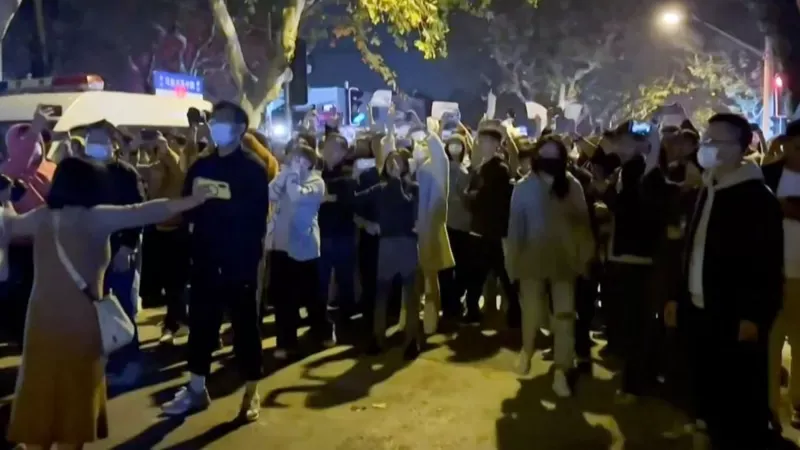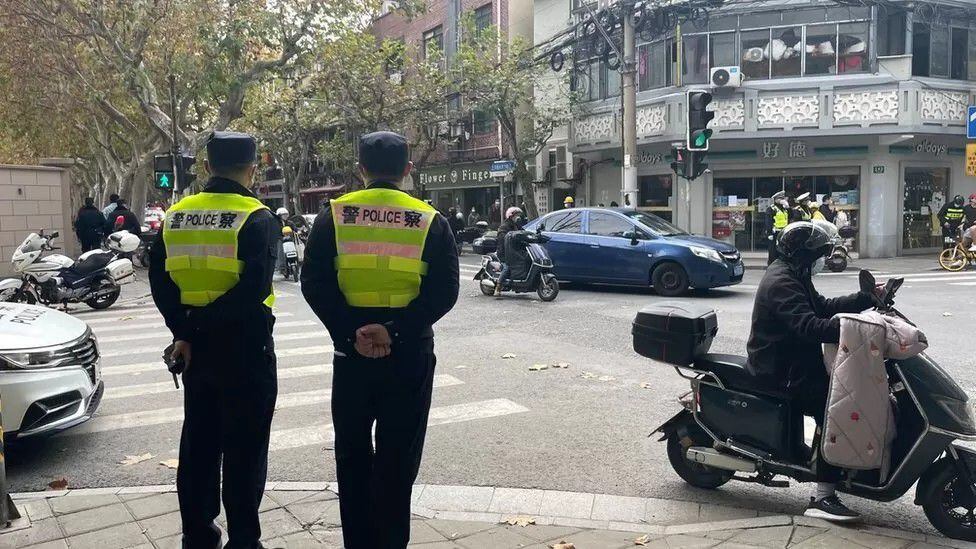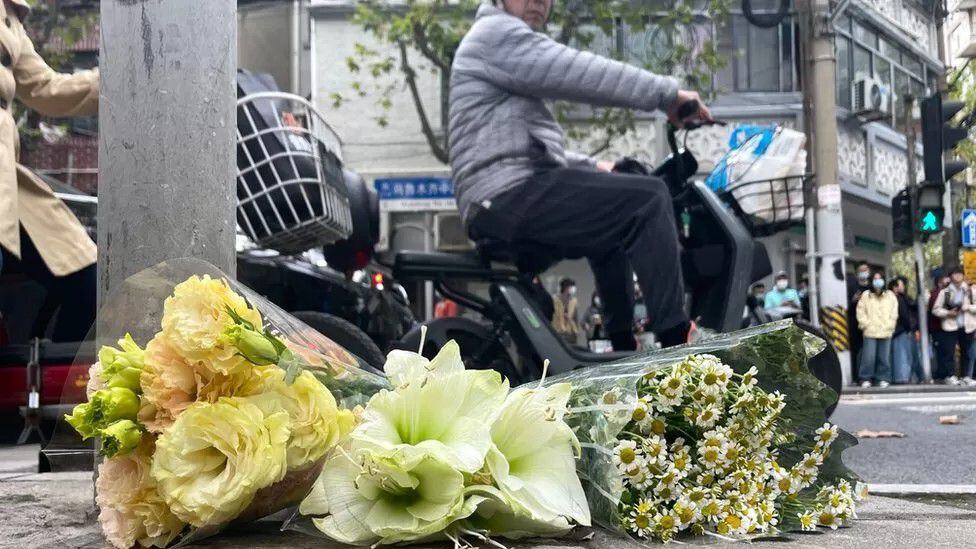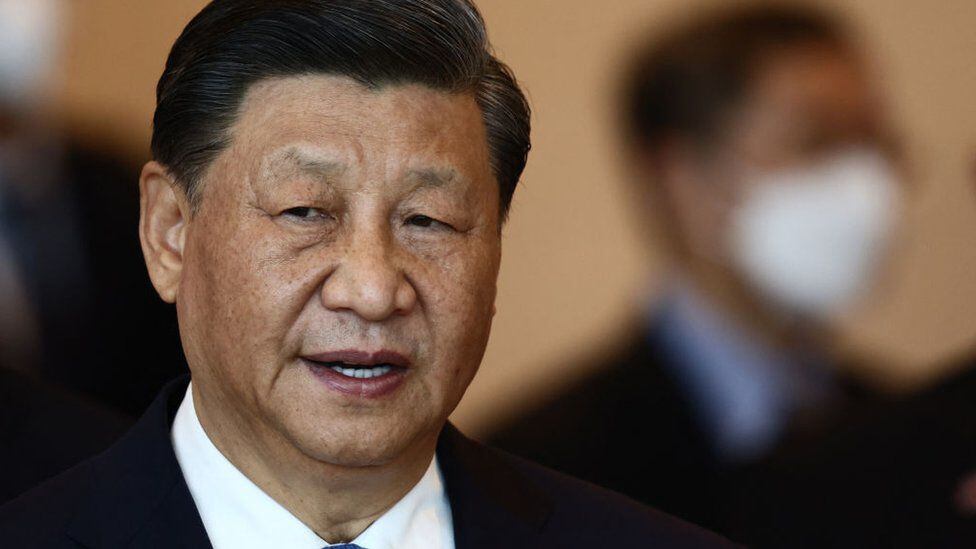the police in China it has been detaining a number of people because of the anti-government protests that have spread to several of its big cities. The demonstrations present an unprecedented challenge to President Xi Jinping.
The protests that began against the restrictions by the covid in China as a result of a fire that killed 10 people in an apartment block in Urumqi, capital of the Xinjiang Uyghur Autonomous Region, spread this Sunday to the capital, Beijing, and in Shanghai.
LOOK: BBC denounces the arrest of one of its journalists in China who was covering the protests against COVID-19
Hundreds of people demonstrated holding blank sheets of paper in a silent protest, while others publicly called for the resignation of Chinese leader Xi Jinping.
But on Monday morning the streets of Shanghai appear to have gone quiet, with footage showing normal traffic activity.
Nevertheless, police in Shanghai detained several people at the scenewhere the only reminder of the weekend demonstrations seem to be the rows of blue barricades.
the protests
Thousands of people took to the streets of Shanghai on Saturday to remember the victims and demonstrate against the restrictions. Many demanded the resignation of the president Xi Jinping.
Instead of abating, the demonstrations reached the capital, where hundreds of people gathered on the banks of a river, singing the national anthem and listening to speeches.
Earlier, at the prestigious Tsinghua University, dozens of people performed a peaceful march and they also sang the national anthem, according to photos and videos posted on social networks.
Protests were also registered in the city of Chendu (southwest) and in the most central cities of Xi’an and Wuhan, where the covid pandemic originated almost three years ago.

Stephen McDonell, the BBC’s correspondent in China, said the Chinese authorities appear to have “drastically underestimated the discontent with the zero covid strategy, a policy that is inextricably linked to Xi Jinping, who recently vowed that it would not change.”
“Xi Jinping, resign”
The police have generally allowed people to demonstrate, but in Shanghai the BBC saw at least three people being taken away in police cars.
Many point to confinement in buildings as the cause of deaths in the fire in Urumqi.
While Chinese authorities deny that this was the cause, city officials issued an unusual apology on Friday night and vowed to “restore order” by phasing out restrictions.
At the protest in Shanghai, China’s largest city and world financial center, some people were seen lighting candles and leaving flowers for the victims.

Others shouted slogans like “Xi Jinping, resign” and “Communist Party, resign.” Some also held blank banners.
These kinds of lawsuits are unusual in China, where any direct criticism of the government and the president can result in harsh sanctions.
One protester told the BBC he was “shocked and emotional” to see people out on the streets, saying that it was the first time he had seen large-scale dissent in China.
He also said the lockdowns had made him feel “sad, angry and hopeless” and left him unable to see his sick mother, who was undergoing cancer treatment.
Another protester explained to the BBC that the police officers were asked how they felt about the protests and the answer was “Like you”. But, she said, “they wear their uniforms, so they’re doing their job.”
Others recounted acts of violence, with one protester telling the AP news agency that one of his friends had been beaten by police at the scene, while two others had been pepper-sprayed.
police presence
Although the situation in Shanghai had calmed down by Sunday morning, the BBC saw an increased police presence in the protest area, with several dozen police officers, private security guards and plainclothes police on the streets.

Elsewhere, at several Chinese universities, photos and videos of students also protesting on Saturday night surfaced online. The largest crowd seemed to be at the Nanjing University of Communications.
Videos of the protests are difficult to independently verify, but many of them show a unusually explicit and open criticism the government and its leader.
________________________
unusual protests
Tessa Wong, BBC Digital Reporter in Asia
The Urumqi fire was a nightmare scenario for many Chinese who have found themselves under widespread restrictions in recent months, locked in their apartments with no way to escape, according to some accounts.
Authorities have disputed these claims, but this has not stopped public outrage and anxiety from spreading.
The incident has become the latest tipping point in growing frustration. Millions are tired of tthree years of movement restrictions Y daily covid tests.

The anger has spread to every corner of China, from major cities to remote regions like Xinjiang and Tibet, and has galvanized all sectors of society, including young university students, factory workers and citizens. common.
As this anger grows, protests against covid measures have become increasingly common. But even the demonstrations this weekend are unusual in this new normal, both in their number and in the frankness of his criticism of the government and President Xi Jinping.
Taking to the streets en masse with hundreds of people calling for President Xi’s resignation was thought unthinkable not long ago.
But after a recent dramatic protest on a Beijing bridge that shocked many, a precedent appears to have been set for the expression of a more open and sharp dissidence.
Others have also chosen to wave the Chinese flag and sing the national anthem, whose lyrics uphold revolutionary ideals and urge the people to “rise up, rise up.”
It’s a show of patriotism that could also be read as an expression of solidarity with fellow Chinese who are suffering under Xi’s zero covid policy, and a call to action.
________________________
The protests are the latest in an accelerating series of demonstrations against China’s Covid-zero measures that have also grown increasingly bold in their criticism of the government and President Xi.
The zero covid strategy is the latest policy of its kind among the world’s major economies and is due in part to the relatively low vaccination levels of China and the effort to protect the elderly.
Last-minute lockdowns have sparked anger across the country, and broader covid restrictions have sparked recent violent protests from Zhengzhou to Guangzhou.
Despite strict measures, the number of cases in China this week reached historical records since the pandemic began.
Source: Elcomercio
I am Jack Morton and I work in 24 News Recorder. I mostly cover world news and I have also authored 24 news recorder. I find this work highly interesting and it allows me to keep up with current events happening around the world.

:quality(75)/cloudfront-us-east-1.images.arcpublishing.com/elcomercio/SRDU5G3PBBFGXNGMKTYLSLX6FU.webp)

:quality(75)/cloudfront-us-east-1.images.arcpublishing.com/elcomercio/5QHXBF3WQFDJRAZZVWS3C6DV4M.jpg)
:quality(75)/cloudfront-us-east-1.images.arcpublishing.com/elcomercio/BUO6EJ5KRZHLFCS3FWMMF5HBPQ.jpg)
:quality(75)/cloudfront-us-east-1.images.arcpublishing.com/elcomercio/4XELV2MPRJBEFAQHHY3C43N2BY.jpg)
:quality(75)/cloudfront-us-east-1.images.arcpublishing.com/elcomercio/XRYCA3XOPRAYTDJS7CC6YA5P5I.jpg)
